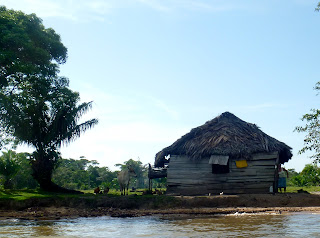That's what Chabil Utzaj means - a sugar refinery/company in Alta Verapaz, near Panzós
Looking very attractive from the road
With some black smoke enhancing the pretty view
The sugar cane plantations have taken
over a lot of the areas we visited. Even while in the meeting,
talking to people about the problems, there were trucks driving past,
loaded with sugar cane. Later on, we drove past the ill-smelling,
black-smoking factory. The sugar cane is a very obvious, very visible
example as you drive through the countryside, but there are other, as
bad or worse, companies in the area. The problem is the richness of
the country in terms of natural resources, good earth, many rivers,
petroleum and metal. Rivers can be dammed, earth used for African
palm trees – which makes it unusable for anything else, and hills
can be delved into for precious and/or other metals. The companies
seem to take no responsibility whatsoever, whether about the
environment, the people, or just following the actual contracts they
have signed. Because of all this, rivers are drying out or getting
contaminated. We have corn only growing to half its original size,
and crops failing. We have children and adults getting gastritis,
cancer, and unexplained illnesses and rashes.
What is the solution? Meetings,
meetings and more meetings. First the population needs to be aware of
their rights. Second they need to be able to arrange meetings with
the local authorities, with the local people, to have a dialogue
about all this. Thirdly, the meetings need to be taken seriously,
which they rarely are. Many of the people we have met have
experienced that the authorities just walk straight over them, after
having all these meetings and making agreements that will at least
benefit the locals slightly more than the alternative. We also met a
representative from charity church organisation Caritas, who had
worked with these issues many years. And as she said, you can work
for years without seeing any progress at all. You just need to keep
on, informing people, going to meetings, and hoping that at some
point it will work.
We have also met a few who have managed
the impossible, and changed the outcome, and saved some of their own
environment – but I can't even remember who, or when, or where,
because we've met so many who have said the opposite.
This is also directly tied up with the film I posted the other day: Evictions in the Polochic Valley. This is in the Polochic Valley. The owners of the company are the Germans in the film.
Want to read two completely different views on this? My view is, as you can tell, much closer to the people's one, because that's what I've seen and heard as well. I also generally believe more in people's stories than those of employees in a for-profit company.
























